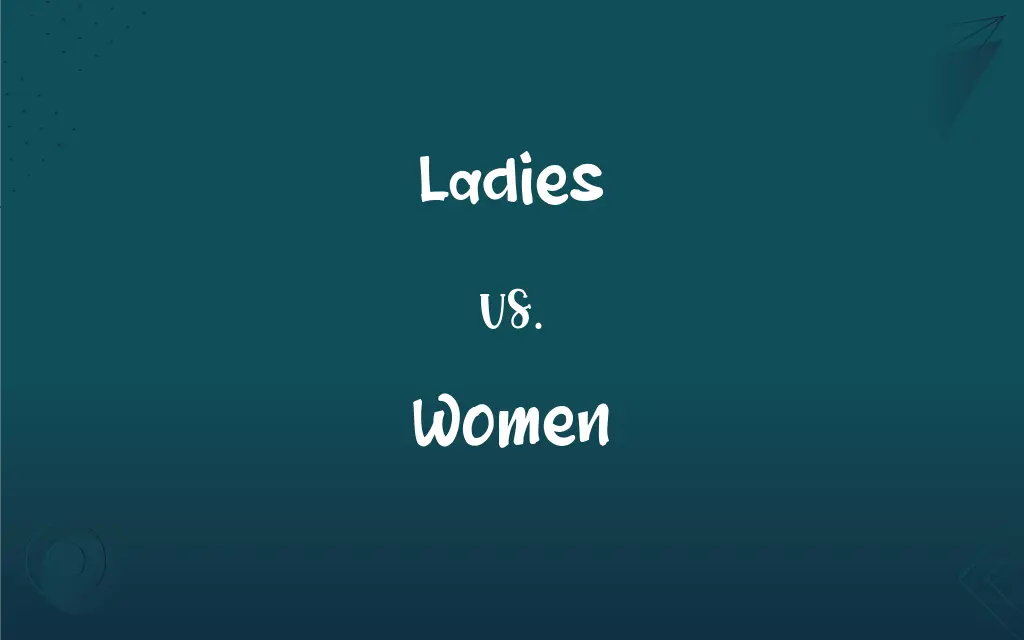Ladies vs. Women: What's the Difference?
Edited by Aimie Carlson || By Harlon Moss || Updated on October 30, 2023
"Ladies" often connotes politeness or formality, while "women" is a neutral term for adult females. Both words denote adult females but differ in tone and context.

Key Differences
"Ladies" and "women" both refer to adult females, but they carry different connotations and are used in different contexts. "Ladies" is often seen as a more polite or formal term, reminiscent of a time when societal norms were more rigidly defined. On the other hand, "women" is a straightforward term that neutrally identifies adult females, without any added implications of politeness or decorum.
When addressing a group of adult females, one might use "ladies" to add a touch of politeness or respect. For instance, in formal gatherings or events, it's common to hear "Good evening, ladies." In contrast, the term "women" would likely be used in more neutral or factual contexts. For example, a news report might state, "The conference was attended by women from various industries."
Furthermore, the term "ladies" has seen shifts in its usage over time. In certain contexts, especially in modern times, it can sometimes be seen as old-fashioned or even patronizing. However, "women" remains a standard term with consistent meaning across various scenarios. It's the more common term in academic, professional, and many everyday settings.
In literature and media, the choice between "ladies" and "women" can also be a stylistic one, reflecting the tone or setting of a piece. For instance, a historical novel set in the Victorian era might frequently use "ladies" to reflect the norms of the time. Meanwhile, a contemporary piece focusing on gender rights might predominantly use "women" to emphasize empowerment and equality.
Comparison Chart
Connotation
Polite, formal
Neutral, factual
ADVERTISEMENT
Common Usage
Formal events, polite address
Academic, professional, everyday settings
Tone
Respectful, sometimes old-fashioned
Straightforward, neutral
Historical Context
More common in older, traditional settings
Consistently used across different eras
Reaction in Modern Contexts
Can sometimes be seen as patronizing
Largely remains neutral, often used in empowerment contexts
Ladies and Women Definitions
Ladies
Ladies can sometimes have old-fashioned connotations.
The club, reminiscent of past times, was reserved for ladies of high society.
ADVERTISEMENT
Women
Women can emphasize empowerment and equality.
The march celebrated the achievements of women worldwide.
Ladies
Ladies is a term of respect when addressing groups.
Good morning, ladies.
Women
Women is a neutral term without added formalities.
Women have played pivotal roles throughout history.
Ladies
Ladies often implies politeness or courtesy.
The host greeted the ladies with a warm smile.
Women
Women is commonly used in academic and factual contexts.
The study focused on women aged 25 to 45.
Ladies
Ladies is used as a formal address to adult females.
May I help you, ladies?
Women
Women is the plural form of woman, referring to adult females.
The seminar was designed for women entrepreneurs.
Ladies
Ladies can suggest refinement or elegance.
The room was filled with ladies dressed in their finest attire.
Women
Women is less likely to be seen as patronizing in modern contexts.
The organization promotes health initiatives for women.
FAQs
Are "ladies" and "women" synonymous?
Both refer to adult females, but "ladies" often has a more polite or formal connotation than "women."
Is "ladies" considered old-fashioned?
In certain modern contexts, "ladies" can be seen as old-fashioned or even patronizing.
Are there contexts where "ladies" is inappropriate?
In modern gender discussions, "ladies" might be avoided in favor of the more neutral "women."
Is "women" the more modern term?
"Women" is a consistently used term across eras, but it might be preferred in more modern, empowerment-focused contexts.
When should I use "ladies" over "women"?
"Ladies" is typically used in more formal or polite contexts, while "women" is neutral.
Can "ladies" be used in professional settings?
It can, but care should be taken as "women" is often preferred to avoid any potentially patronizing connotations.
Which term emphasizes empowerment: "ladies" or "women"?
"Women" is often used in contexts emphasizing empowerment and equality.
How has the use of "ladies" evolved over time?
Historically more common in formal settings, its use has shifted, and in some contexts, it's now seen as old-fashioned or patronizing.
Is it grammatically correct to use "ladies" and "women" interchangeably?
While both refer to adult females, context matters; they aren't always interchangeable.
Do all adult females prefer to be addressed as "ladies"?
Preferences vary; some may see it as respectful, while others might find it old-fashioned.
Can "ladies" ever imply a higher social status?
Historically, "ladies" could imply refinement or higher social status, but this is less common now.
Which term is more common in academic writing: "ladies" or "women"?
"Women" is typically more common in academic contexts due to its neutrality.
What's the key difference between addressing a group as "ladies" vs. "women"?
"Ladies" often adds a touch of politeness or formality, while "women" is straightforward and neutral.
Are there any controversies around the use of "ladies"?
In certain modern contexts, "ladies" can be seen as patronizing, leading to some debate about its use.
Can "women" ever have a formal connotation like "ladies"?
While "women" is neutral, the context in which it's used can lend it formality.
What is the singular form of "women"?
The singular form of "women" is "woman."
Is "ladies" only used in formal settings?
Not necessarily, but it often connotes formality or politeness.
Can using "ladies" be seen as respectful?
Yes, it can be seen as a term of respect, especially in certain formal or traditional settings.
In literature, when might authors prefer "ladies" over "women"?
Authors might use "ladies" in historical settings or to convey a specific tone or formality.
Is "ladies" used universally across English-speaking countries?
Its usage might vary, but "ladies" is understood in English-speaking countries, though connotations can differ.
About Author
Written by
Harlon MossHarlon is a seasoned quality moderator and accomplished content writer for Difference Wiki. An alumnus of the prestigious University of California, he earned his degree in Computer Science. Leveraging his academic background, Harlon brings a meticulous and informed perspective to his work, ensuring content accuracy and excellence.
Edited by
Aimie CarlsonAimie Carlson, holding a master's degree in English literature, is a fervent English language enthusiast. She lends her writing talents to Difference Wiki, a prominent website that specializes in comparisons, offering readers insightful analyses that both captivate and inform.
































































